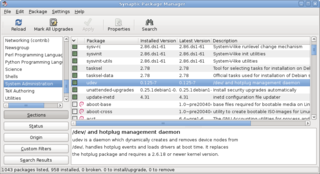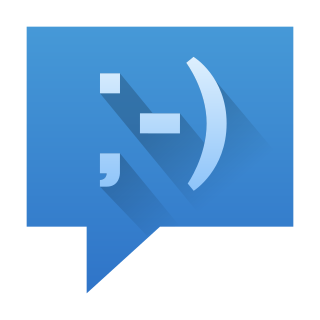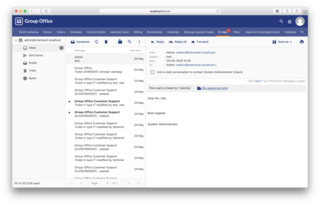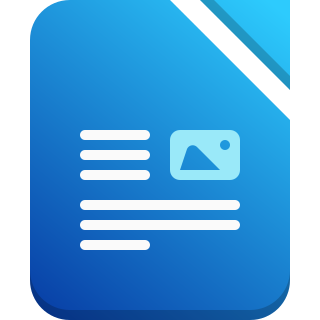
A package manager or package-management system is a collection of software tools that automates the process of installing, upgrading, configuring, and removing computer programs for a computer in a consistent manner.

CinePaint is a free and open source computer program for painting and retouching bitmap frames of films. It is a fork of version 1.0.4 of the GNU Image Manipulation Program (GIMP). It enjoyed some success as one of the earliest open source tools developed for feature motion picture visual effects and animation work. The main reason for this adoption over mainline GIMP was its support for high bit depths which can be required for film work. The mainline GIMP project later added high bit depths in GIMP 2.9.2, released November 2015. It is free software under the GPL-2.0-or-later. In 2018, a post titled "CinePaint 2.0 Making Progress" announced progress, but, as of 2024, version 2.0 has not been released.

Kopete was a multi-protocol, free software instant messaging client released as part of the KDE Software Compilation. Although it can run in numerous environments, it was designed for and integrates with the KDE Plasma Workspaces. Kopete was started because ICQ blocked Licq from their network in 2001. According to the original author, Duncan Mac-Vicar Prett, the name comes from the Chilean Spanish word copete, meaning "a drink with your friends". Kopete has been nominated for multiple awards. The designated successor is KDE Telepathy from the KDE RTCC Initiative.

SmallBASIC is a BASIC programming language dialect with interpreters released as free software under the GNU General Public License version 3 for Microsoft Windows, Linux and Android.

StarDict, developed by Hu Zheng (胡正), is a free GUI released under the GPL-3.0-or-later license for accessing StarDict dictionary files. It is the successor of StarDic, developed by Ma Su'an (馬蘇安), continuing its version numbers.

FontForge is a FOSS font editor which supports many common font formats. Developed primarily by George Williams until 2012, FontForge is free software and is distributed under a mix of the GNU General Public License Version 3 and the 3-clause BSD license. It is available for operating systems including Linux, Windows, and macOS, and is localized into 12 languages.

Lazarus is a cross-platform, integrated development environment (IDE) for rapid application development (RAD) using the Free Pascal compiler. Its goal is to provide an easy-to-use development environment for developing with the Object Pascal language, which is as close as possible to Delphi. It is free and open-source software with different parts released under different software licenses.

DNN Platform is a web content management system and web application framework based on the .NET Framework. It is open source and part of the .Net Foundation.
HTML Tidy is a console application for correcting invalid HyperText Markup Language (HTML), detecting potential web accessibility errors, and for improving the layout and indent style of the resulting markup. It is also a cross-platform library for computer applications that provides HTML Tidy's features.
A desktop environment is a collection of software designed to give functionality and a certain look and feel to an operating system.

Group-Office is a PHP based dual license commercial/open source groupware and CRM and DMS product developed by the Dutch company Intermesh. The open source version, Group-Office Community, is licensed under the AGPL, and is available via GitHub. GroupOffice Professional is a commercial product and offers additional business modules like project management, finance, HR and time tracking.
This is a comparison of notable free and open-source configuration management software, suitable for tasks like server configuration, orchestration and infrastructure as code typically performed by a system administrator.

eyeOS was a web desktop for cloud computing, whose main purpose is to enable collaboration and communication among users. It is mainly written in PHP, XML, and JavaScript. It is a private-cloud application platform with a web-based desktop interface. eyeOS delivers a whole desktop from the cloud with file management, personal management information tools, and collaborative tools, with the integration of the client's applications.

WeeChat is a free and open-source Internet Relay Chat client that is designed to be light and fast. It is released under the terms of the GNU GPL-3.0-or-later and has been developed since 2003.
Cppcheck is a static code analysis tool for the C and C++ programming languages. It is a versatile tool that can check non-standard code. The creator and lead developer is Daniel Marjamäki.

LibreOffice Writer is the free and open-source word processor and desktop publishing component of the LibreOffice software package and is a fork of OpenOffice.org Writer. Writer is a word processor similar to Microsoft Word and Corel's WordPerfect with many similar features, and file format compatibility.

NanoLinux is an open source, free and very lightweight Linux distribution that requires only 14 MB of disk space including tiny versions of the most common desktop applications and several games. It is based on the Core version of the Tiny Core Linux distribution and uses Busybox, Nano-X instead of X.Org, FLTK 1.3.x as the default GUI toolkit, and SLWM. The included applications are mainly based on FLTK.

Q4OS is a light-weight Linux distribution, based on Debian, targeted as a replacement for operating systems that are no longer supported on outdated hardware. The distribution is known for an addon called XPQ4, which adds themes intended to replicate the look and feel of Windows 2000, XP, 7, 8 and 10.










